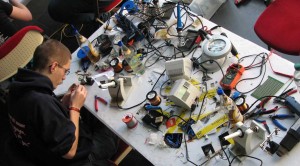Geeks line the hallways, young men in black t-shirts each with a laptop. And they’re always young men. There are no girls here. There are a dozen open wifi networks and I wouldn’t trust any of them. There are tangles of cables. There are anarchists. There are flying robots and broken flying robots being soldered in public.
The air is thick with something, but I don’t know what.
It’s not just tech but politics, a worldview. One of the only non-black t-shirts says “stop software patents.” The government is the enemy; this is not an argument, just an assumption. “Managers and politicians have discovered technology too,” reads the summary of one talk, “but they have one serious disability: they aren’t geeks and thus by definition not capable of using it in a useful, effective way.”
Some of the best computer security researchers in the world are here. “Computer security researchers.” Hackers. We’re just showing where the problems lie, they say. There’s a talk about running your own GSM base station. It’s neat. “This part of the encryption system, no one has broken yet,” says the presenter. “Unfortunately.”
All software should be free and open. The government needs to be maximally transparent. All standards should be open, because security through obscurity is beyond laughable. Intellectual property is theft. A poster on the wall says “Meet Wall-E on ftp” and gives an address where the blu-ray rip can be downloaded. There are 780 kb/s of bandwidth per person at this conference center.
A man gets on the stage of the main room for the 6:00pm session, titled “we got hacked by (rhymes with ‘unease’) and all we got was a t-shirt.” He announces that the presenters have been contacted by the Secret Service and asked not to disclose anything that is not already public. They couldn’t change their slides in time and so, says the man, “this talk has been cancelled by the United States Government.” The rhyme is “Chinese.”
There are some heavy hitters here. There are some big stories. There are secrets. Most of the boys here harbour adolescent fantasies that the government, some government, is after them — and only their foolproof use of open-source anonymity and encryption technology can prevent the awful abuse of power. Others, just a few, actually are in trouble with the government or some nameless corporate power or other. There are lawyers here. There are also quacks.
I’m tempted to give a talk called “computer security without anarchist politics.”
But this sprit, this politics — this is what made technology in the first place. This is the basic mucking around with microprocessors that led to the personal computer. This is the next generation of ace software engineers, security experts, technology laywers. These kids building robots that balance on their heads and playing with old mechanical crossbar switches — they make such a great sound when the dial of the old rotary telephone turns! — some of them won’t be able to help changing the world. That’s the part of this myth that isn’t myth: technology is powerful. And fun. And it needs to be freed from the hordes of black-shirted boys tapping on tiny laptops, like me.
